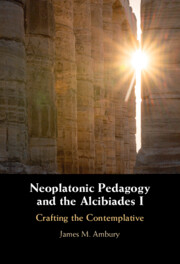Book contents
- Neoplatonic Pedagogy and the Alcibiades I
- Neoplatonic Pedagogy and the Alcibiades I
- Copyright page
- Dedication
- Epigraph
- Contents
- Acknowledgements
- Abbreviations
- Introduction
- Chapter 1 The Self-Knowledge Necessity
- Chapter 2 Exalting Eros
- Chapter 3 How Should I Live?
- Chapter 4 What Do I Want?
- Chapter 5 Who Am I?
- Bibliography
- Names Index
- Passages Index
- Subject Index
Chapter 3 - How Should I Live?
The Elenctic Section (106c3–119a7)
Published online by Cambridge University Press: 16 May 2024
- Neoplatonic Pedagogy and the Alcibiades I
- Neoplatonic Pedagogy and the Alcibiades I
- Copyright page
- Dedication
- Epigraph
- Contents
- Acknowledgements
- Abbreviations
- Introduction
- Chapter 1 The Self-Knowledge Necessity
- Chapter 2 Exalting Eros
- Chapter 3 How Should I Live?
- Chapter 4 What Do I Want?
- Chapter 5 Who Am I?
- Bibliography
- Names Index
- Passages Index
- Subject Index
Summary
Chapter 3 takes up the Elenctic section of the dialogue, in which Socrates begins to chisel away at Alcibiades’ hubris in an effort to expose his double ignorance, that is, his ignorance of his ignorance. The young man hastens to the Athenian bema, eager to give a speech about justice, but estranged from justice beyond the level of ethical virtue. Without self-knowledge, he desires nothing other than the accolades of the many and asks not even the simplest question about justice, to say nothing of ascending to contemplate it as intelligible reality. Socrates refutes him in order to remove his arrogant pretension, not only that he knows justice, but that he knows himself. Generally, the Elenctic section removes the obstacles that stand in the way of Alcibiades’ conversion, and the Neoplatonic student learns that he must undergo a similar cleansing to that of Socrates’ interlocutor – Alcibiades’ purification is that of any philosophical initiate.
Keywords
- Type
- Chapter
- Information
- Neoplatonic Pedagogy and the Alcibiades ICrafting the Contemplative, pp. 75 - 151Publisher: Cambridge University PressPrint publication year: 2024

